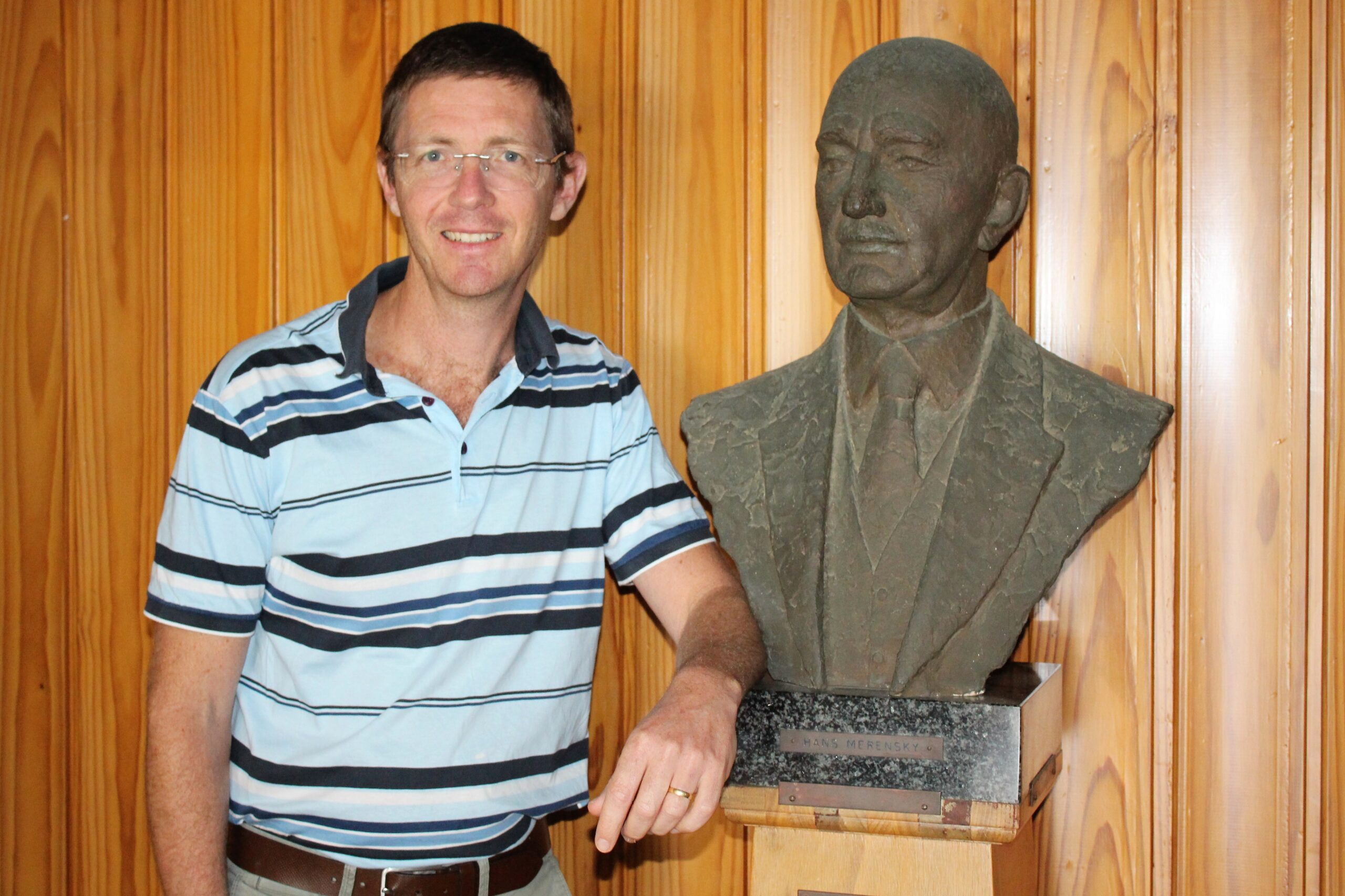
The Hans Merensky Chair in Measuring and Modelling Eucalypt Growth & Wood Formation
Understanding growth in the world's most widely planted hardwoods
Helping people grow
Post authored by Engela Duvenage
“I have always been interested in how trees grow, and how their wood forms. It’s fascinating, and I have various ideas on how it happens. As I’ve grown older, though, I’ve increasingly become passionate about students and providing them with an environment in which they can grow too. I’d say people have increasingly become my passion.”
So says Prof David Drew, the Hans Merensky Research Chair in Advanced Modelling of Eucalyptus Wood Formation (or EucXylo), who was recently promoted to associate professor in the SU Department of Forest and Wood Science. For this NRF-rated researcher, it is a great privilege to be able to work with “clever, bright people.”

He is also grateful for the R10,9 million funding being received between 2019 and 2023 through the Hans Merensky Foundation towards the activities of EucXylo (see story on this page).
“It provides us with a huge amount of freedom and flexibility to pursue different directions,” mentions this former editorial board member of the European Journal of Forest Research and guest editor of Annals of Forest Science.
Prof Drew believes in forming strong industry-based alliances, in delivering students who are able to play their part in the forestry and wood sector, and in the value of thinking strategically.
He enjoys a strong relationship with key industrial partners in the Australian and South African forest industries, and collaborates on research projects with colleagues in Belgium, Sweden, Chile, Switzerland and China.
“I also work closely with scientists at Mondi, Sappi, York Timbers and Merensky, as well as with high level management, to assist them to drive and direct aspects of their research programs in the area of Forest Growth and Yield.”
Prof Drew is a forestry science graduate of Stellenbosch University, having graduated in 1999. He joined SU as an academic in 2015 and has since been involved in the lives and work of 24 postgraduate students – 12 of whom are current students.
His field of expertise is that of forest forecasting in which various simulations and modelling are used to predict the future growth and yield of plantations.
It’s something well worth knowing, as potentially foresters can wait their entire careers before they are to know whether the trees that they have planted have produced satisfactory wood. This is especially true when working with species only ready for harvest after 30 years’ worth of growth.
He is also interested in the computational modelling of wood formation, particularly in the genus Eucalyptus, and along with his students delves into matters related to precision measurements and tree growth monitoring, tree, and forest eco- and cambial physiology, as well as the modelling of xylem development and tree growth.
Prof Drew completed a Master’s degree in Biology (2005) from the (then) University of Natal while doing research work for the Council for Scientific and Industrial Research (CSIR), after which his full-time PhD (2008) from Monash University in Australia followed. It dealt with ways to describe and predict variations in temporal growth and wood properties in Eucalyptus trees. Thereafter he received valuable experience as a postdoctoral fellow and research scientist at Australia’s premier research body, CSIRO, based in Tasmania.
He is thankful about his time in Australia, as it allowed him to cement ongoing relationships with leading scientists at CSIRO, and at institutions like University of Sunshine Coast, Southern Cross University, and the University of Tasmania.
This period also introduced him to research into the effects that elevated CO2 levels might have on fine-scale growth patterns of eucalypts – an issue that could impact the quality of the wood that the trees produce. The topic of climate change, and its potential impact on the value of commercial tree species such as Eucalyptus, is being covered by many of EucXylo’s postgraduate students.
Over the years his students’ research has been supported through industry funding worth more than R2,6 million, from Forestry South Africa (who coordinate THRIP and Strategic Innovation Fund research funding), Sappi and Mondi.
He believes in working across disciplines, and therefore actively pursues strong linkages with SU academics in other departments and faculties.
“I have strong working relationships, including student co-supervision, with colleagues such as Prof Guy Midgley of the Department of Botany and Zoology, Dr Paul Hills of the Institute for Plant Biotechnology (IPB), Prof Hugh Patterton, an expert in computational biology, and Mr. Stefan Nel of the Faculty of Engineering.”
He is thankful for the excellent facilities on offer to researchers through the University’s Central Analytical Facility (CAF). “It has allowed me to push the boundaries of my area of science, and to establish close linkages with scientists like Prof Anton Du Plessis from the CT Scanner unit and Ms Lize Engelbrecht from the microscopy unit.
One of his career highlights has been leading the organisation of an international conference in Stellenbosch in conjunction with the International Union of Forestry Research Organisations (IUFRO), of which Stellenbosch University is a member. “This was a great success with over 40 international delegates and a similar number of representatives from our South African forestry industry, as well as generous sponsorships from these companies being received.”